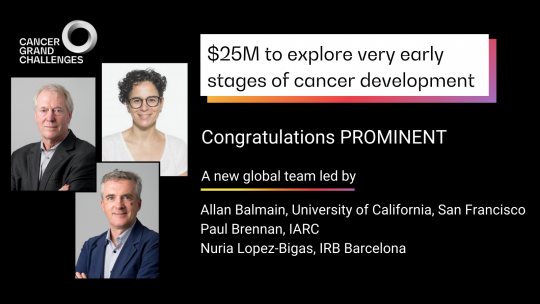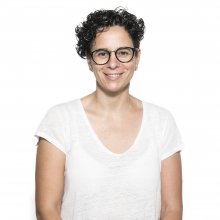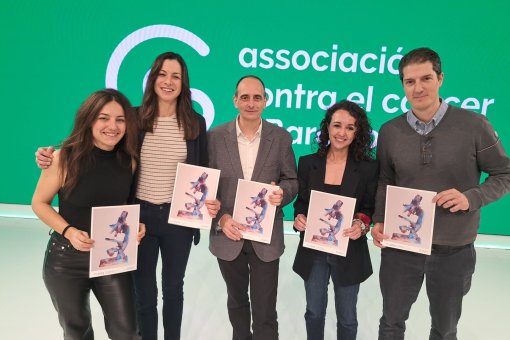Images
- The Asociación Española Contra el Cáncer (AECC) invests €2.5m and joins Cancer Research UK and the US National Cancer Institute in the Cancer Grand Challenges community to drive progress in some of the toughest challenges in cancer research.
- The project will receive $25m to take on the Normal Phenotypes Challenge, which seeks to unlock new information about the early stages of tumour development and identify new ways to prevent cancer.
- The PROMINENT team is led by Dr. Nuria Lopez-Bigas at IRB Barcelona, Dr. Allan Balmain at University of California, San Francisco and Dr. Paul Brennan at the International Agency for Research on Cancer.
A world-class team of researchers co-led by IRB Barcelona’ Dr. Nuria Lopez-Bigas has been selected to receive a $25m Cancer Grand Challenges award to investigate the very early stages of cancer development. Co-founded by Cancer Research UK and the US National Cancer Institute, Cancer Grand Challenges is a global funding platform that supports a community of diverse, global teams to come together, think differently, and take on some of the toughest challenges in cancer research.
The Cancer Grand Challenges PROMINENT team, co-led by Allan Balmain (University of California, San Francisco) and Paul Brennan (International Agency for Research on Cancer (IARC)), will be working to answer questions about the very early stages of tumour development – what keeps healthy cells healthy and what triggers a cell to become cancerous? The answers are likely to be more complex than we once thought, and the team will build on recent findings that suggest cells can remain seemingly ‘normal’ despite carrying cancer-causing mutations in their DNA. With this information, the team will build a ‘roadmap’ of early cancer development in the hope of finding new, informed ways to stop cancer before it starts.
“It’s been exciting to think about how we’re going to bring our complementary expertise together to tackle this big question – with Cancer Grand Challenges, we've had the opportunity to build a great team,” said co-team leader Dr. Lopez-Bigas, ICREA researcher and head of the Biomedical Genomics lab at IRB Barcelona. “I’m excited about getting to work together on this.”
The PROMINENT team unites advocates and scientists with expertise in epidemiology, genetics, imaging, and other fields, in five institutions across Spain, France and the US. The team, which is co-funded by Cancer Research UK, the US National Cancer Institute and the Asociación Española Contra el Cáncer, aims to find new ways to prevent cancer development, which could dramatically reduce the burden of this disease around the world.
The team is one of four new ones announced yesterday as part of Cancer Grand Challenges, representing a total investment of €90m to diverse, global teams to take on some of the toughest challenges in cancer research.
“Cancer is a global issue that needs to be met with global collaboration. This investment in team science encourages diverse thinking to approach problems that have long hindered research progress,” said Dr. David Scott, Director of Cancer Grand Challenges, Cancer Research UK. “Cancer Grand Challenges provides the multidisciplinary teams the time, space and funding to foster innovation and a transformative approach. PROMINENT is one of four newly funded teams joining a scientific community addressing unmet clinical needs across cancer research.”
More information:
Cancer Grand Challenges supports a global community of diverse, world-class teams with awards of €24m to come together, think differently and take on the toughest challenges in cancer research.
These are the obstacles that continue to impede progress and no one scientist, institution or country will be able to solve them alone. Cancer Grand Challenges teams are empowered to rise above the traditional boundaries of geography and discipline.
Founded by the two largest funders of cancer research in the world, namely Cancer Research UK and the US National Cancer Institute*, Cancer Grand Challenges aims to make the progress against cancer we urgently need.
Cancer Grand Challenges currently supports more than 700 researchers and advocates across 10 countries, in which 11 teams are supported to take on 10 of the toughest challenges in cancer research.
Announced on 16 June 2022, the Cancer Grand Challenges PROMINENT team is taking on the initiative’s Normal Phenotypes challenge. It is led by Professor Allan Balmain (University of California, San Francisco), Dr. Paul Brennan (WHO International Agency for Research on Cancer, France), and Dr. Nuria Lopez-Bigas (Institute for Research in Biomedicine, Spain), along with six co-investigators and two patient advocates, and involves five institutions across the US, Spain and France: Duke University; Institute for Research in Biomedicine; International Agency for Research on Cancer; Stanford Medicine; and University of California, San Francisco. The Cancer Grand Challenges PROMINENT team is funded by Cancer Research UK, the National Cancer Institute, part of the US National Institutes of Health, and the Asociación Española Contra el Cáncer, Spain.
The PROMINENT team is one of four new teams announced on June 16.
About IRB Barcelona
The Institute for Research in Biomedicine (IRB Barcelona) pursues a society free of disease. To this end, it conducts multidisciplinary research of excellence to cure cancer and other diseases linked to ageing. It establishes technology transfer agreements with the pharmaceutical industry and major hospitals to bring research results closer to society, and organises a range of science outreach activities to engage the public in an open dialogue. IRB Barcelona is an international centre that hosts 400 researchers and more than 30 nationalities. Recognised as a Severo Ochoa Centre of Excellence since 2011, IRB Barcelona is a CERCA centre and member of the Barcelona Institute of Science and Technology (BIST).






